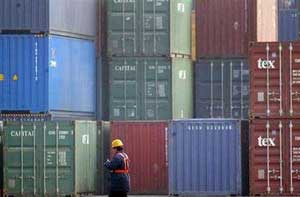|
US: Ready to use all options vs China on trade
(Reuters/chinadaily.com.cn)
Updated: 2006-03-17 08:13
The United States will do whatever it can, including filing a case with the
World Trade Organization (WTO), to stop China discriminating against certain
U.S. goods, Deputy U.S. Trade Representative Karan Bhatia said.
After a "top-to-bottom" review of its trade relations
with China, the U.S. concluded it should treat China as a "mature trading
partner," that must bear its responsibilities under a global rules-based trading
system.

A Chinese worker walks past containers in
Longwu Port in Shanghai, January 11, 2006.
[Reuters] |
"The United States is prepared to use all necessary tools to secure China's
compliance with its WTO commitments," Bhatia, on a visit to the Philippines,
told reporters on Thursday.
"Hopefully, we will be able to work through those problems without resorting
to litigation.
"But the hallmark of a mature trading relationship, and I think increasingly
we and China have a mature trading relationship, is that we can make use of WTO
mechanisms if it is needed," he said.
Both the U.S. and
the European Union contend that China was violating WTO rules by imposing high tariffs on foreign
auto parts after exceeding a certain quantity.
Many members of the U.S. Congress have urged the Bush administration to take
stronger action on trade with China, arguing that the Asian state deliberately
undervalues its currency by 15 to 40 percent to give its exporters an advantage.
Bhatia's comments come ahead of a Senate vote later this month on a bill that
would impose a 27.5 percent tariff on Chinese exports to the U.S. unless Beijing
revalues its currency.
Chinese
Premier Wen Jiabao ruled out any further one-off surprise ajustment of renminbi
exchange rate Tuesday after the conclusion of the annual session of China's top legislature.
Wen promised that his government would allow the yuan to
move more flexibly but saw no need for another one-off surprise adjustment such
as last July's 2.1 percent revaluation against the dollar.
"According to the current market-oriented currency formation regime, there is
room for the yuan to fluctuate either up or down on its own in line with changes
in the market. It's no longer necessary for China to take one-off administrative
measures," Wen told a news conference.
The yuan has risen by about 1 percent since it was revalued by 2.1 percent on
July 21, 2005, depegged from the dollar and set free to float in a managed
bands.
|